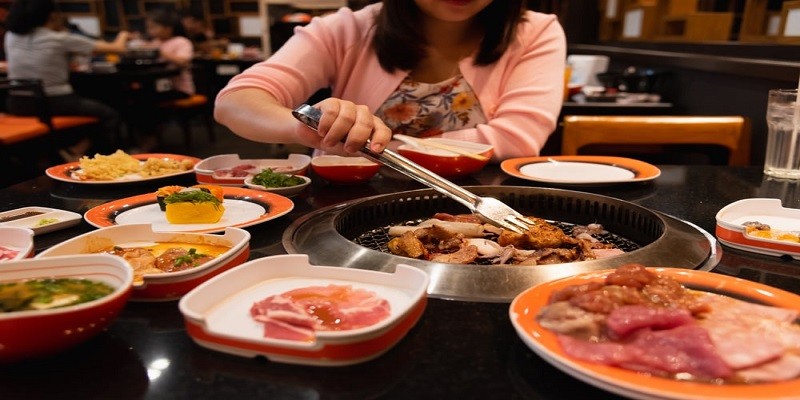Last Updated on June 1, 2024
Yes, you can eat Korean BBQ while pregnant, but it is crucial to follow certain safety precautions. Ensure that all meats are thoroughly cooked to avoid the risk of foodborne illnesses, and be mindful of cross-contamination between raw and cooked foods.
Korean BBQ is a popular dining experience that involves grilling various meats, often at the table. For pregnant women, enjoying this culinary delight requires some extra caution. This article will explore the safety measures, nutritional value, and potential risks associated with eating Korean BBQ during pregnancy, providing a comprehensive guide for expectant mothers.
What is Korean BBQ?
Korean BBQ, or “gogi-gui,” is a method of grilling meat, typically beef, pork, or chicken, often at the dining table. The meats are usually marinated in a mixture of soy sauce, garlic, sesame oil, and other spices, then grilled over a gas or charcoal grill. This communal dining experience is complemented by various side dishes known as “banchan,” which include kimchi, pickled vegetables, and rice.
Nutritional Value of Korean BBQ
| Nutritional Value | Details |
|---|---|
| Calories | Varies by meat type; typically around 190-310 calories per 4 oz serving |
| Protein | High protein content, approximately 20g per 4 oz serving |
| Fat | Can be high, especially in fatty cuts like pork belly; around 8-23g per 4 oz serving |
| Carbohydrates | Generally low, but can increase with marinades and sauces; around 9g per 4 oz serving |
| Vitamins and Minerals | Rich in iron, zinc, and B vitamins, essential for pregnancy |
Risks of Eating Korean BBQ During Pregnancy
| Risks | Details |
|---|---|
| Foodborne Illnesses | Risk of bacteria like listeria, E. coli, and salmonella from undercooked meat |
| High Sodium Content | Can lead to high blood pressure and fluid retention |
| High Fat Content | May cause heartburn and indigestion |
| Cross-Contamination | Risk of using the same utensils for raw and cooked meat |
Safe Ways to Eat Korean BBQ During Pregnancy
To safely enjoy Korean BBQ during pregnancy, ensure all meats are thoroughly cooked to an internal temperature of at least 145°F (63°C) for beef and pork, and 165°F (74°C) for chicken. Avoid cross-contamination by using separate utensils for raw and cooked meats. Opt for lean cuts of meat and limit the intake of high-sodium sauces and marinades.
Alternatives to Korean BBQ During Pregnancy
| Alternatives | Precautions |
|---|---|
| Grilled Tofu or Tempeh | Ensure they are cooked thoroughly |
| Vegetarian Dishes | Avoid raw vegetables and unpasteurized ingredients |
| Homemade Korean Dishes | Control ingredients and cooking methods for safety |
Experts Tips
- Cook Thoroughly: Always ensure that meats are cooked to the recommended internal temperatures to avoid foodborne illnesses.
- Avoid Cross-Contamination: Use separate utensils and plates for raw and cooked meats to prevent bacterial transfer
- Moderate Sodium Intake: Limit the use of high-sodium sauces and marinades to prevent high blood pressure.
FAQs
Can I eat kimchi while pregnant?
Yes, kimchi is generally safe to eat during pregnancy as it is a fermented vegetable dish. However, ensure it is from a reputable source to avoid contamination.
Is it safe to eat bibimbap during pregnancy?
Yes, bibimbap can be safe if the egg is fully cooked and lean cuts of meat are used. Avoid raw or undercooked ingredients.
Can I eat gochujang while pregnant?
Yes, gochujang is safe to eat during pregnancy. Ensure it does not contain any raw fish or meat and consume in moderation due to its high sodium content.
What should I avoid at a Korean BBQ while pregnant?
Avoid undercooked meats, raw seafood, and any dishes that may contain unpasteurized ingredients or high levels of sodium.
Can I eat tteokbokki while pregnant?
Yes, tteokbokki, made with rice cakes and a spicy sauce, is safe to eat during pregnancy as long as it is cooked thoroughly.
Conclusion
Eating Korean BBQ while pregnant is possible and can be enjoyable with the right precautions. Ensure all meats are thoroughly cooked, avoid cross-contamination, and moderate your intake of high-sodium and high-fat foods. By following these guidelines, you can safely indulge in the rich flavors of Korean BBQ while supporting a healthy pregnancy.

